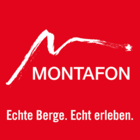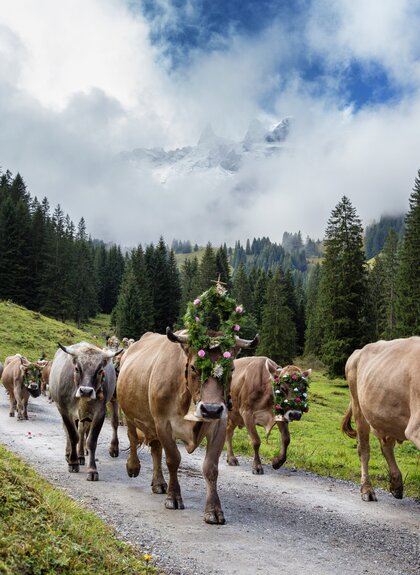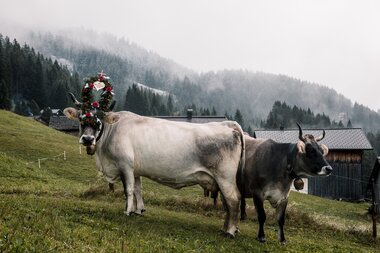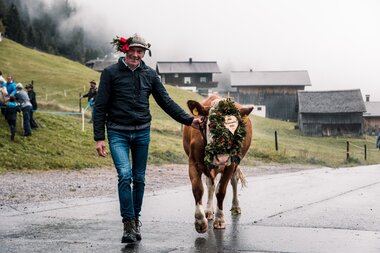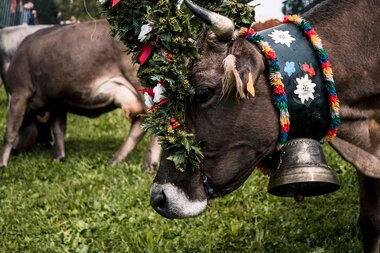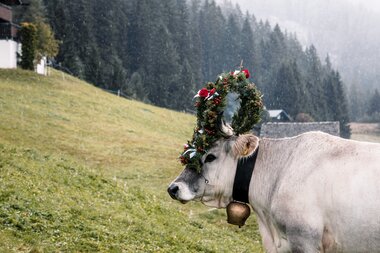Alpine cattle drives
The end of the summer retreat
For centuries, the cattle have returned well-fed from the high Alps to the valley in September. The cattle drive is a special event - farmers welcome their healthy cattle with gratitude and festivities.
The procession of decorated animals - some of which include sheep, goats and donkeys, the so-called "Piefl" - often accompanied by music, attracts many visitors. The "Milchstöfleri", the cow with the highest milk yield, is especially honored, adorned with the most magnificent "Maien", the flower decoration. The exact date depends on the weather - early snowfall or too little water can bring it forward.
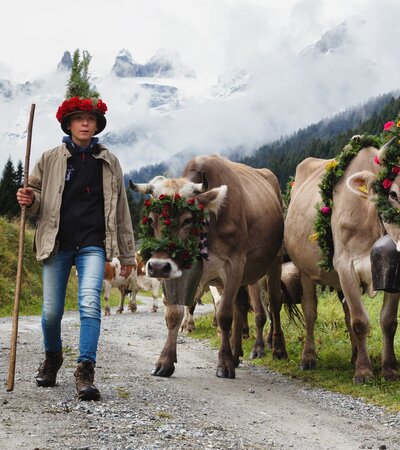
"In the last few days on the Alpe, the mood is one of departure. The cattle sense when the summer is coming to an end. They don't have to be herded. The animals are looking forward to the valley. "
Alpine pasture manager Martin Netzer, Alpe Spora
More about three-stage agricultureThree-stage farming
Thanks to three-stage farming, the cattle drives in the Montafon have hardly changed over time. The farmer and his cattle follow the fodder: at the beginning of June, they go from the home barn in the valley to the Maisäß (1,200-1,400 m), about two hours' walk above the permanent settlement.
Once the fodder supplies there are exhausted, the alpine master takes over the cattle and drives them up to the high alp - to lush mountain meadows and aromatic herbs.
How is the cattle drive celebrated in the valley?
The weather and grass growth determine the exact date of the cattle drive, usually mid to late September. Also in their luggage: the last pieces of butter, mountain cheese and Sura Kees, made directly on the alp from fresh milk.
When the festively decorated procession passes through the village, the people and animals are greeted by admiring glances and hearty applause. "It's an incredibly great feeling when so many people greet you. It makes me very proud as an Alpine master," says Markus.
How has the celebration of the cattle drive changed?
In the past, farmers used to give cider and schnapps to the Alpine herdsmen and shepherds as a thank you for bringing the cattle home safely. The alpine summer was celebrated in small groups.
Today, the celebrations are bigger: village festivals, farmers' markets, live music and cheese tastings accompany the arrival of the animals. But the core remains the same - the appreciation for a traditional alpine economy.
The animals come from the Alps to the valley
The festive culmination of the farming year in Tschagguns.
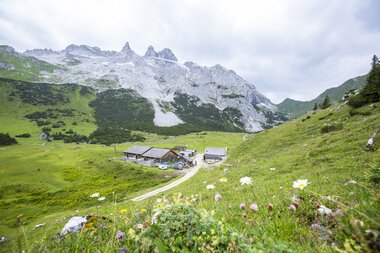
Patron saints and symbols of luck
Difficult terrain, bad weather, accidents and illness are just some of the dangers to which people and animals are equally exposed. In the past, the mostly religious peasant population expected protection and help from the cattle patron saints Gallus, Martin and Leonhard. Horseshoes and thistles on the walls of houses and stables were supposed to keep bad luck away. But even today, an alpine pasture without a cross is unthinkable.
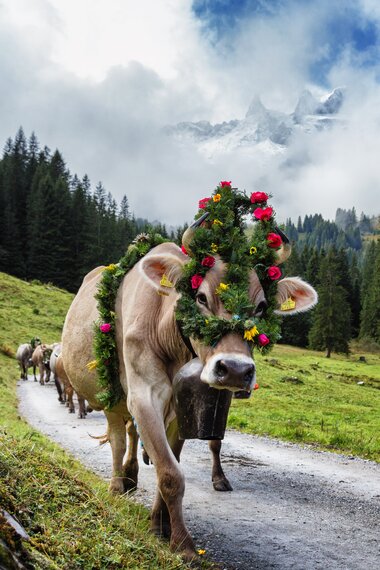
Thanks to the gracious nature
If the prayers helped and the Alpine pasture did not suffer any losses over the summer, the highlight of the farming year, the cattle drive, is celebrated with festivities. The cattle are decorated with wreaths and colorful flowers for their return to the valley. Alpine roses, mountain pines and silver thistles are used to elaborately handcraft crowns for the animals. The cows wear large bells around their necks, the powerful ringing of which is supposed to ward off evil spirits.
Good to know:
If you're wondering why not all cows return to the valley decorated, there are various reasons for this. There are various reasons for this. On some alps, flower decorations are an integral part of the tradition, while on others - such as those with suckler cows - they are often dispensed with. The idea that unadorned cattle are a sign of bad luck was and is not upheld everywhere. Today, the Alpine cattle drive takes many forms: It reflects regional customs, agricultural practice and at the same time the changing times.
Dates 2025
| Saturday, AUGUST 30 |
|---|
|
ALPE LATONS // Bartholomäberg // village center
|
| Friday, 05 SEPTEMBER |
|---|
|
UNTERE GAFLUNA ALPE // Silbertal // Almastall (50 meters into the valley after Gasthof Teich on the left-hand side)
|
|
Saturday, 06 SEPTEMBER |
|---|
|
ALPE VERGALDEN // Gargellen // Gargellen cable car valley station
ALPE NOVA & ALPE ZAMANG // St. Gallenkirch // Valisera cable car valley station
ALPE LÜN // Vandans // Parish church
|
|
Saturday, SEPTEMBER 13 |
|---|
|
ALPE FRESCH // Silbertal // Würeboden (legend festival)
ALPE SPORA, VOLLSPORA, LATSCHÄTZ, TILISUNA & HORA // Tschagguns* // village center
*Traffic obstructions are to be expected in the period from 10:30 to approx. 13:00: Partial closure of the Latschauerstraße from the Rätikon junction (L188) to Latschau Stausee. Traffic will be diverted via Rasafeistraße on a case-by-case basis. Zelfenstraße from the village center to Rasafeibach difficult to pass. Public transportation (601, 602, and 603) will also not run from 10:00-13:00.
|
|
Saturday, SEPTEMBER 20 |
|---|
|
ALPE VALSCHAVIEL // Gaschurn // Of dr Röfi - entrance to the Valschaviel valley
|
|
Saturday, SEPTEMBER 27 |
|---|
|
SCHAFSCHEIDE GARNERA // Gaschurn // Bargaplatz Trantrauas (from the parking lot of the Versettla cable car 5 minutes' walk in the direction of Ganeu/Garnera)
|
Note:
Please note that changes are possible at short notice due to weather conditions and dates may be postponed.
Due to the limited number of parking spaces, we recommend traveling by public transport. You can find the Montafon timetable here.
